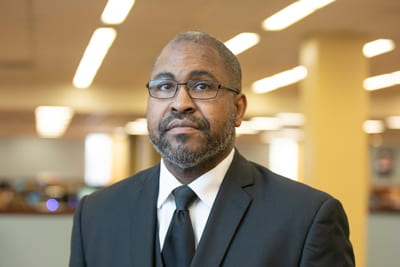SESW Elementary and Special Education Faculty in the Spotlight: Dr. Bret Cormier

Meet Dr. Bret Cormier, the newest member of the Elementary and Special Education program who began his term as chair on August 1.
What brought you to Providence College? What made you choose it over other opportunities?
The personal reasons that I was excited about the opportunity to come to Providence was that I feel like I have come full circle. I am a Roman Catholic from the womb. I went to Catholic school most of my life and was educated by the Jesuits. I went to a private liberal arts school for my undergraduate degree like Providence.
My professional reasons were the opportunities to be part of a prestigious college community and team, the work that is being done with teachers and leaders, and helping to get our teacher and leadership students into Providence Public Schools. I worked in West Hartford, Connecticut when I was a K-12 teacher, and was planning to get my Ph.D. at Harvard, but the winters were too hard on me being a native Texan. My roommate in West Hartford was getting his Ph.D. at Brown, I would come to Providence once a month to visit, have dinner, and go out with him, and I loved it. For me, this was too good of a personal and professional opportunity to pass up.
What motivated you to choose the field of education as your career?
I went to Park University to get my Bachelor’s degree in Pre-Law/Criminal Justice and a minor in Political Science. I also was in the Army Reserves while in college and spent my sophomore year in Saudi Arabia, Iraq, Kuwait, and many other places in the Middle East. When I came back, I entered ROTC and was commissioned as an officer. I got an active duty commission so I did not go to law school, as I had planned, and I entered the U.S. Army as a light infantry officer where I served for 8 and a half years. I ended up entering education through the Troops to Teachers program after I separated from the Army. They sent me to graduate school to get my initial teaching certification in Special Education and Elementary Education. I eventually was certified in Secondary Social Studies. I taught four years at the elementary level, 5th grade, and 4 years of U.S. History at the high school level. I eventually ended up in administration at the campus-level and in district-level leadership. I really enjoy working with students and families there is no greater work.
What is your area of research? How did you arrive at this area?
My primary area of research is the achievement gap. I started that work because when I worked in Austin, I was in charge of 14 low-performing schools and I became interested in the process of how they could become high-performing schools. That initial research turned into studying principals and superintendents to see how their leadership decisions affects the climate and culture of organizations. Because I have mostly worked in low income/working class /blue, collar/working poor urban and rural districts, my work also looks at race, ethnicity, culture, and class. I also study the school to prison pipeline, as I am a critical theory researcher who uses the Deficit Thinking Paradigm to examine structural inequalities in the system.
The biggest reason I chose these areas of study are due to my background. As an African-American male who grew up in the height of the drug war, the profound effect that the drug war had on schools, the criminal justice system, as well as how policing changed really influenced me. Plus, I student taught for a year in the juvenile justice boot camp program teaching gang members who had been kicked out of their schools, due to behavior and violations of zero tolerance programs. Both of these experiences had a profound impact on me so that is why I study them.
What is it about teaching that brings you joy?
I really do enjoy my work. There is no greater joy than working with children and families. The goal is for students to use education as the vehicle to reach their highest aspirations. I firmly believe that the purpose of teaching is to effect social change and produce a more active citizenry. Although my graduate training has been in the field of education, I have always been committed to the interdisciplinary lens of learning and the world. In my own work, I utilize theories from a variety of disciplines and am partial to social theory. This inclination is evident in my teaching as well. My lessons continually present education as the social and cultural event that it truly is. I strive to engage my students critically through readings, assignments, discussions, and in-class activities.





